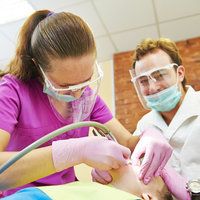Study Predicts ADA Exodus if Controversial Resolution Passes
A new report claims thousands of dentists will leave the American Dental Association if a resolution related to sedation dentistry is enacted.

Just ahead of the American Dental Association’s (ADA) annual meeting, a group representing healthcare providers have issued a report estimating that more than 10,000 general dentists will discontinue their ADA memberships if the convention’s
is passed.
This controversial resolution is a continuation of Resolution 77, which was deferred by the ADA at its 2015 annual meeting. Resolution 37 will revise guidelines for the use of sedation and general anesthesia in dental practices. Additionally, educational guidelines for both dentists and dental students regarding pain control and the use of sedation in dentistry could also come under revision. The economic impact study cited by TEAM 1500 concluded that the financial impact to both patients and dental providers will be substantial. Data for the study was gathered from a variety of practicing dental health professionals, dental school academics, regulatory experts, and financial forecasters.
According to
, the consequences of the passage of Resolution 37 include higher fees, fewer dentists qualified to administer sedation, and increased difficulty for patients in accessing safe, affordable oral sedation treatments. They also noted that patients who require sedation for dental treatments will have to pay as much as twice the current fees as a result of the new guidelines, with the average cost of a standard teeth cleaning under sedation exceeding $500 per treatment.
In addition, the study found that higher dental fees to cover the increased cost of providing sedation dentistry, together with longer wait times to see a qualified dentist, will drive patients away from dental practices. T1EIS estimated that as many as 50.000 patients will stop getting routine dental treatment within two years of the passage of the resolution. Most of these patients will come from lower-income and minority communities.
The independent study forecast that many general dental practitioners will be driven out of practice altogether as a result of the dramatic increase in cost.
revised guidelines would double the amount of training that is currently recommended, with the cost of additional training potentially reaching $50,000 per dentist. As it was noted in the study, many dentists and dental students might not be willing to spend so much extra money and defer time treating patients in favor of extended education.
A
was held earlier this month to address dental provider concerns regarding Resolution 37.